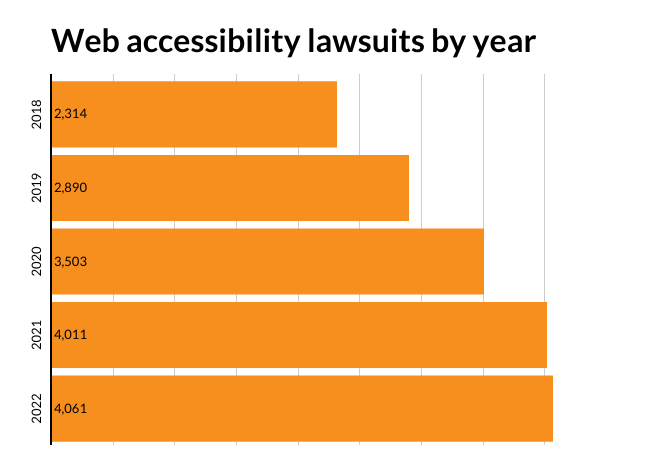Ecommerce retailers remain vulnerable to lawsuits targeting accessibility requirements, according to new data from UsableNet, a digital accessibility research company. Unclear legal requirements also leave users with disabilities to fend for themselves, as the law is primarily enforced through lawsuits.
Legal requirements vary
The lawsuits UsableNet tracked involve the 1990 Americans With Disabilities Act (ADA). Different courts adopted various interpretations of the law, but the general consensus under the ADA and many state and local laws is that ecommerce websites must be accessible to users with disabilities, Tim Springer, CEO of digital accessibility solutions company Level Access, said in an interview.
Blind customers who use screen readers to access the web bring the majority of these lawsuits, UsableNet says, but they also include people with auditory disabilities who file lawsuits over videos that lack captions.
Lawsuits are up, but things are slowing down
There were more ADA ecommerce lawsuits in 2022 than in any of the four previous years, UsableNet found. Plaintiffs filed about 100 lawsuits each week, totaling 4,061, more than 70 cases per week. That number roughly kept pace with 2021, which recorded just slightly fewer with 4,011 cases. Filings seem to have leveled off after larger jumps in 2019, 2020, and 2021.

Data courtesy of UsableNet
More than 600 lawsuits in 2022, about 19% of total filings, named companies that were previously named in other ADA-related lawsuits. Sometimes the same plaintiff files a lawsuit about an ecommerce website and a second about the accompanying app, sometimes the suits are from another plaintiff, and sometimes they are against sister brands under the same parent company.
Ecommerce companies are by far the biggest risk for these lawsuits, amounting to 77% of cases, UsableNet found. The food service industry was in a distant second place, at 8% of cases.
Lawsuits target big and small retailers
The biggest ecommerce players face the most lawsuits, but retailers of all sizes are at risk, according to UsableNet. Lawsuits against companies with revenue of less than $50 million per year are on the rise, though they still make up less than one-third of total filings.
Many of the largest ecommerce retailers have already been the subjects of lawsuits and now have accessibility programs. That means plaintiffs have moved on to smaller ecommerce firms that don’t have those policies in place yet, UsableNet reported. The pandemic also pushed retailers to conduct more business online, so there are more companies to file potential lawsuits against.
Big companies are still the most at risk
The biggest ecommerce retailers remain the most likely recipients of lawsuits, according to UsableNet’s data. 20% of Digital Commerce 360’s Top 500 online retailers in 2022 were named in ADA lawsuits in 2022, and 78% of them, 391, were named in ADA digital lawsuits since 2018. Gap (No. 19), Zola (No. 326), Barnes and Noble (No. 109), and Goop (No. 156) were each named in ADA lawsuits in 2022.
Larger companies have an outsized risk of lawsuits because they tend to be more complex, with frequently changing code, and often have a physical location that makes more accessibility requirements apply, per UsableNet.
A holistic approach is best
Making an ecommerce website truly accessible is “more of an art than a science,” Level Access’ Springer told Digital Commerce 360. There’s a misconception among retailers that there’s an exact set of technical requirements that companies can meet to become totally accessible, Springer said, but that’s often not the case.
This plays out in the data, too. Some retailers use accessibility widgets to outsource making websites accessible, but that’s no guarantee that it works, or that they are safe from lawsuits. 575 of web accessibility lawsuits in 2022 named businesses using widgets, a 36% increase over 2021.
Springer says the solution must be both technical and human. Businesses will often “only get the bare minimum by focusing on compliance with the law,” he said. Instead, retailers should make a genuine effort to make a website as accessible as possible, with a goal of usability rather than simply complying with the law.
Sign up
Stay on top of the latest developments in the ecommerce industry. Sign up for a complimentary subscription to Digital Commerce 360 Retail News.
Follow us on LinkedIn, Twitter and Facebook. Be the first to know when Digital Commerce 360 publishes news content.
Favorite